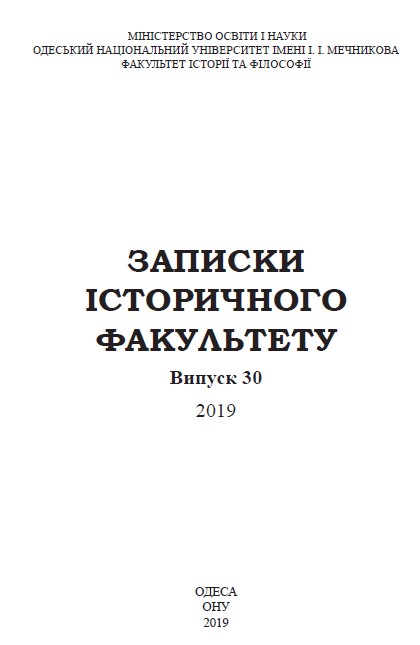«ДОБРУДЖАНСЬКЕ ПИТАННЯ» В ЗОВНІШНІЙ ПОЛІТИЦІ РУМУНІЇ ТА ПОЗИЦІЯ ВЕЛИКОЇ БРИТАНІЇ НАПЕРЕДОДНІ ТА В ПЕРІОД РОБОТИ ПАРИЗЬКОЇ МИРНОЇ КОНФЕРЕНЦІЇ (1918–1919)
«DOBRUDJA QUESTION» IN FOREIGN POLICY OF ROMANIA AND POSITION OF THE GREAT BRITAIN EVE OF AND DURING A PERIOD WORK PARIS PEACE CONFERENCE (1918–1919)
Author(s): Olexandr DemchenkoSubject(s): Diplomatic history, Political history, International relations/trade, Pre-WW I & WW I (1900 -1919), Peace and Conflict Studies
Published by: Видавництво «Одеський національний університет І. І. Мечникова»
Keywords: Dobrudja question; Romania; Bulgaria; the Great Britain; the Paris Peace Conference;
Summary/Abstract: In the presented article the author highlights the main direction of its foreign policy Romania on Southern Dobrudja lands at the end of the First World War and the period of the Paris Peace Conference (1918–1919 ). The article highlights the work and the struggle for peace with the Balkan states of Romania and Britain politicians, diplomats and civil society towards preserving peaceful relations in the period of operation of the Paris Peace Conference. The most radical departure from the principle of national self-determination which practiced Foreign-Office came in relation to Romania’s frontier with Bulgaria. The tasks are to characterize the content of the work of the Romanian diplomatic commission in the direction of the defending the rights to South Dobrudja and the determination of the position of Great Britain as for territorial independence of the region. The main thesis of the article is that after First World War Romania sought to large an alliance with at least one of the Great Powers in case of an attack on South Dobrudja, in this sense, Romania’s diplomatic success was only partial. The Romanian government realized that only the permission of the Great Powers, such as Great Britain, would strength its presence in the region. The Great Britain treated ambiguously towards such aspirations of Romania. For the first, Foreign Office was not forgotten for Bucharest the separate peace with the Central Powers in 1918. For the second, Britain diplomatic and military mission at Southern Dobrudja did not take the politics of the terror of Romanian in Bessarabia. The Great Britain provided a summary of the position in Southern Dobrudja: provisional British military occupation is the only possible solution for the moment, in spite of the unrest this causes to the Rumanian Government. From the first of the being in Paris, the Romanian diplomats were sounded actively the question how the Great Britain and France would see the future status of Southern Dobrudja. The Romanian demand for Southern Dobrudja was strongly citing national self-determination and protecting peace in Balkan. Most in the British delegation hoped that this could be agreed. However, the British and French refused absolutely to compel an ally to surrender territory to an enemy. The decision, British politics believed, lay with Romania: such readjustment could only be made after friendly conversations with the Rumanian Government. It is important that the Rumanian politics themselves should be a consenting party to the cession of Southern Dobrudja and that Romanians should not be left with the feeling that they have been robbed by their Allies to placate their enemies.
Journal: Записки історичного факультету
- Issue Year: 2019
- Issue No: 30
- Page Range: 195-214
- Page Count: 20
- Language: Ukrainian

